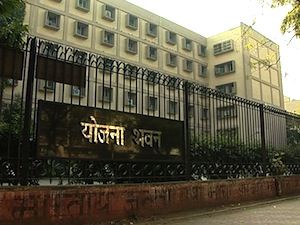The Prime Minister said government was planning to involve knowledgeable people and those who can provide new ideas to redefine and restructure the Planning Commission.
 Plans are afoot for reshaping of the Planning Commission to make it in sync with the changing times, Prime Minister Narendra Modi today said ahead of his meeting with all Chief Ministers on Sunday on the issue.
Plans are afoot for reshaping of the Planning Commission to make it in sync with the changing times, Prime Minister Narendra Modi today said ahead of his meeting with all Chief Ministers on Sunday on the issue.
Making a brief intervention during Question Hour in Lok Sabha, the Prime Minister said government was planning to involve knowledgeable people and those who can provide new ideas to redefine and restructure the Planning Commission.
"I have convened a meeting of Chief Ministers on December 7. We will have a detailed discussions with them.
“In the Planning Commission also there had been discussions earlier on how to bring it in tune with the changing times. Taking all these aspects into consideration, plans are afoot towards a new shape (of the plan panel)," he said.
Earlier, Minister for Planning Rao Inderjit Singh informed the House that planning is very much relevant in India and the Planning Commission has to come to grip with emerging social realities to reinvent itself to make itself more relevant and effective for aligning the planning process with economic reforms and its consequences, particularly for the poor.
Singh said government is seized of the desirability of a constant review of its planning apparatus as the role of the states as well as the state economy, both have been undergoing changes over the last few decades.
"India is now an emerging economy in an increasingly globalised world. The economy has now fundamentally changed with key sectors being open to foreign investment, the evolution of a vibrant dynamic private sector contributing substantially to growth," he said.
The minister said the state has now moved away from allocating government resources in a command and control ecosystem to a more complex role -- that of mediating through policy action, favourable conditions for private investment, providing public goods and essential services and most importantly, directly intervening in areas traditionally neglected by markets, that is, social security and essential entitlements of food, health and education and livelihoods to the vulnerable and marginalised groups.










